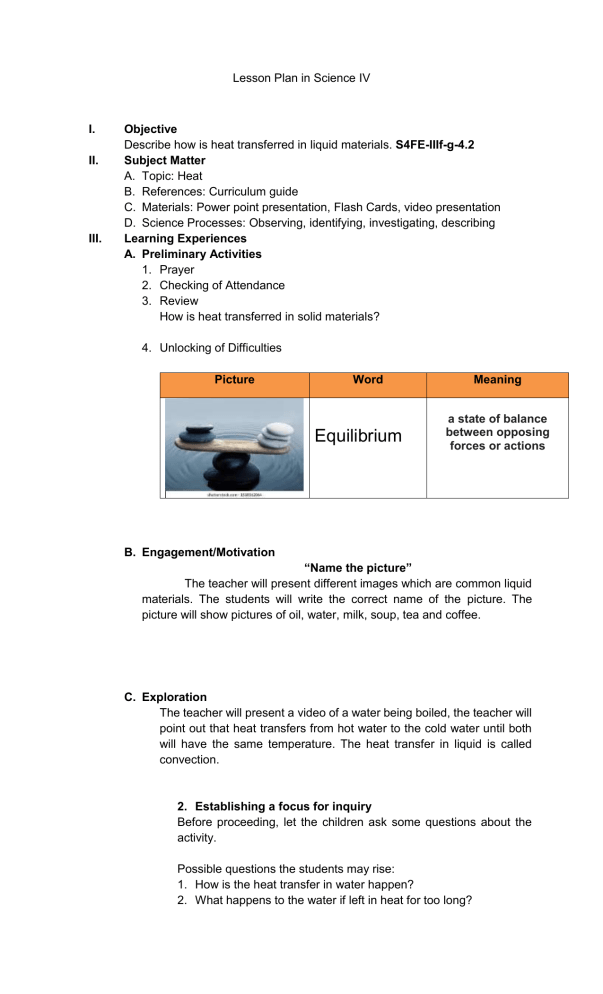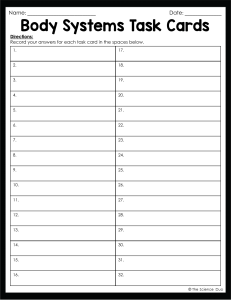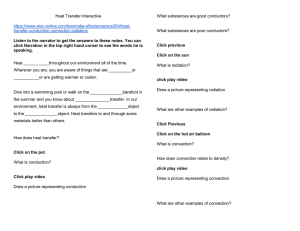
Lesson Plan in Science IV I. II. III. Objective Describe how is heat transferred in liquid materials. S4FE-IIIf-g-4.2 Subject Matter A. Topic: Heat B. References: Curriculum guide C. Materials: Power point presentation, Flash Cards, video presentation D. Science Processes: Observing, identifying, investigating, describing Learning Experiences A. Preliminary Activities 1. Prayer 2. Checking of Attendance 3. Review How is heat transferred in solid materials? 4. Unlocking of Difficulties Picture Word Equilibrium Meaning a state of balance between opposing forces or actions B. Engagement/Motivation “Name the picture” The teacher will present different images which are common liquid materials. The students will write the correct name of the picture. The picture will show pictures of oil, water, milk, soup, tea and coffee. C. Exploration The teacher will present a video of a water being boiled, the teacher will point out that heat transfers from hot water to the cold water until both will have the same temperature. The heat transfer in liquid is called convection. 2. Establishing a focus for inquiry Before proceeding, let the children ask some questions about the activity. Possible questions the students may rise: 1. How is the heat transfer in water happen? 2. What happens to the water if left in heat for too long? 3. Formulating Hypothesis Focus for Inquiry Questions Hypothesis 4. Data gathering I. Ask each group to read their questions and hypothesis. II. Tell each group to discuss their observations and present it to the class. III. Start the activity IV. During the reporting let the students answer the question and prove their given hypotheses. Ask them for additional information they gathered. V. The teacher will check the report of the pupils and redirect them whenever wrong information was relayed. VI. After all the reports the teacher will use the output of the students to explain. 1. Explanation Heat transfer in liquid materials are called convection. For example: We are boiling a water. The heat travels from the hot water to the cold water. Them molecules of the heated part move faster and away from each other. The heat will keep on traveling until the temperature of all the water particles reaches an equilibrium or balance. Always remember that when a heat transfer is occuring in a liquid the warm liquid rises while the cold liquid sinks. Heat can also be transmitted through vacuum or empty spaces this is called radiation. The heat we receive from the sun is called radiant energy. Radiant energy travels as waves in space. Heat waves hit earth and cause its warming. Some of the other heat transfer by radiation are the heat when you are near a fire source, the heat given by an electric heater and the heat near an oven. Generalization: 1. What happens if we put water in a casserole with fire under it? 2. The transfer of heat in liquid materials is called? 3. Heat transfer through vacuum or empty spaces are called? 2. Elaboration/Application Divide the class into four groups. Activity!!!! - Group 1 Present a talk show about how heat transfer in liquid materials. - Group 2 - IV. Write a poem about how heat transfer in liquid materials. Group 3 Present a story about how heat transfer in liquid materials. Group 4 Write a song about how heat transfer in liquid materials. Evaluation Write the letter of the correct answer. 1. Heat travel from hot water to a. hot water b. warm water c. cold water 2. The heat transfer through liquid material is called a. convection b. conduction c. radiation 3. If we leave a casserole on an ignited stove for 3 minutes the water inside it will a. Increase in volume b. Increase in temperature c. remains the same 4. The heat will transfer from hot water to cold water until its temperature reaches a. low temperature b. warm temperature c. equilibrium 5. Heat travel though vacuum or empty spaces is called a. convection b. conduction c. radiation V. Assignment In your daily routine when do you use convection? Prepared by: ALLAN N. DELA CERNA JR. Substitute Teacher




